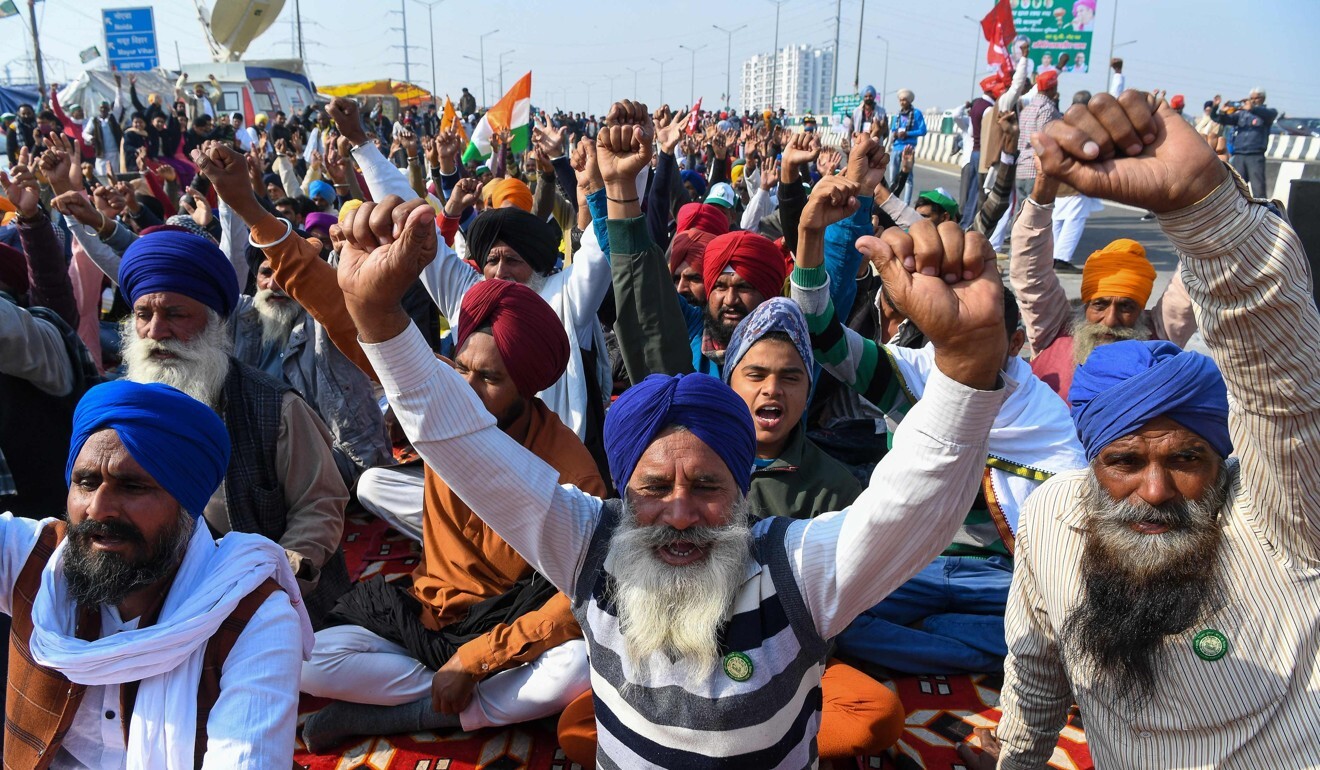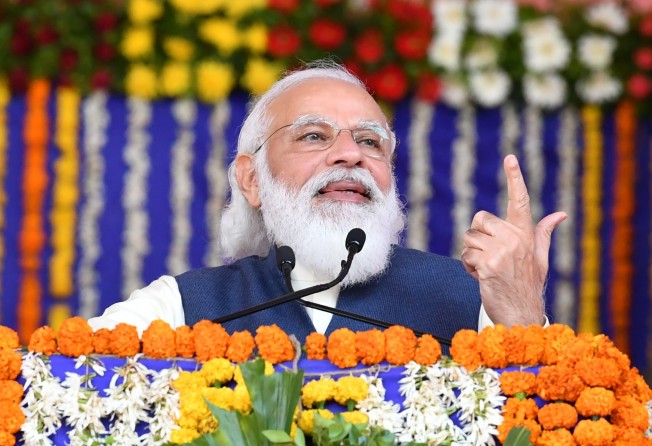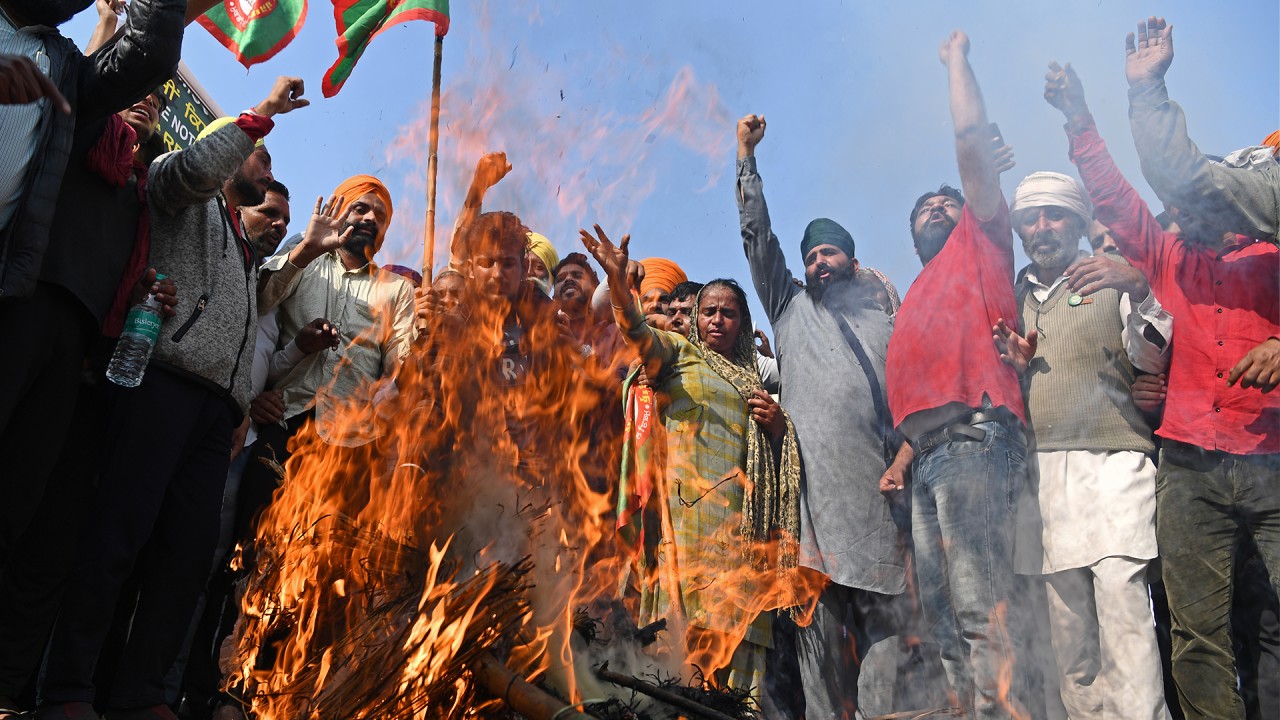
As India enters 2021, Narendra Modi’s Hindutva project is on a roll
- Putting aside the challenges it faced this year, Modi’s government is forging ahead to rescript the idea of India around the myth of a supreme Hindu race
- The resurgence of Chinese clout on the global stage has been a boon for India and Hindutva as other countries seek defence and economic ties with New Delhi

Like most countries in a pandemic year, India under Prime Minister Narendra Modi has had an unusual year. Book-ended by two leaderless mass movements – the first led mostly by women and students, the second by farmers – India 2020 is a sombre montage of a country in search of itself.
More than the prime minister’s made-for-television responses to Covid-19 or the inept handling of the economy, it will be remembered as the year when China challenged India’s primacy in the region by helping itself to some of India’s real estate while a credulous New Delhi was preoccupied in waging a war against the “corona jihadis” – the new appellation given to India’s Muslims by governing party officials.
On the positive side for Modi’s Hindu nationalist party, the Bharatiya Janata Party (BJP), along with its mother organisation, the Rashtriya Swayamsevak Sangh (RSS), their Hindutva project is on a roll – allowing Modi to rescript the idea of India around the myths of a supreme Hindu race predating the arrival of Islamic and Western civilisations on its shores.
Galvanised by Nazi Germany and Mussolini’s Italy, Hindutva took root with the assassination of Mahatma Gandhi by an RSS disciple in 1948. The idea of a Hindu India bloomed with the 1992 destruction of a 16th-century mosque by Hindu mobs and the 2002 anti-Muslim pogrom, which enabled the party’s victory in 2014, with Modi as its CEO intent on remaking India into an authoritarian, Hindu nationalist state.
An interim progress report of the project would conclude that with two defining elections looming and muted international responses to India’s tenacious efforts to downgrade its 200 million Muslims into second-class citizens, the Modi government will accelerate the project in 2021.
The first phase (2014-19) relied heavily on vigilantism that included lynching, hate speech and bludgeoning of minorities. With a larger mandate in May 2019, Modi’s re-election has seen the project go into overdrive with a relentless series of legislative assaults against the Muslims, who comprise 15 per cent of its population. The revocation in August 2019 of the semi-autonomous status of Kashmir, the only Muslim-majority province, and isolating it through despotic means presaged the coming months. A legal victory enabling the construction of a Hindu temple at the site of the demolished mosque followed in November. Weeks later came the next assault – the Citizenship Amendment Act (CAA), which uses religion as a criterion for citizenship under Indian law.

New Year’s Day 2020 in New Delhi began with the third week of peaceful sit-in protests, mostly led by women, against the CAA. The protesters were attacked by violent Hindu mobs on the eve of US President Donald Trump’s visit in February. The attacks drew comparisons to Kristallnacht, when Jewish homes and buildings were destroyed across Germany in 1938, and to the 2002 anti-Muslim pogrom in Gujarat, where Modi was the provincial chief.
Despite police brutality and the loss of 53 lives, the demonstrations carried on until the pandemic came to Modi’s rescue. He promptly imposed a debilitating lockdown just as the protests crossed the 100th day and sent some activists to prison on charges of sedition.
At year’s end, India’s farmers are into the fourth week of protests against agricultural laws rammed through parliament by dubious means by the BJP. Ever vigilant for opportunities to consolidate its gains, the ruling party branded both sets of protesters as antinational, pro-Pakistani, left-wing terrorists and also recommended to “shoot the traitors”.
With the recent revival of the “love jihad” trope – a Hindu right-wing conspiracy theory that claims Muslim men are luring Hindu women into marriage to convert them to Islam – BJP-controlled provinces are enacting laws which, in addition to “anti-love-jihad” vigilantism, are part of the Hindutva project’s strategy to vilify Muslims and outlaw consensual interfaith marriage.
Meanwhile, even as the credibility of the judiciary grows increasingly suspect and the Indian media continues to find opportunities to grovel against the backdrop of a country pitted against itself, the burden of challenging legislation that deforms India’s constitution falls upon a section of its ordinary citizens.
The Modi government has been quick to stifle any perfunctory voices of concern from outside India, forcing organisations like Amnesty International India to shut down operations in the country. When the United States Commission on International Religious Freedom (USCIRF) 2020 annual report concluded that religious freedoms in India were plummeting during Modi’s second tenure, New Delhi predictably rejected it as a “biased” organisation.

‘Our children will starve’: Indian farmers defend protests against new laws as workers join strike
The resurgence of Chinese political and economic clout on the global stage is a boon to the Hindutva project. As nations scramble to develop a wider alliance to offset China’s growing influence and build strategic, defence and economic partnerships with India, no country would want to be on the wrong side of New Delhi by adopting a persuasive stance on the subject of human rights.
Much like the global war on terror that gave Pakistan, a pivotal player in that war, a free pass to weaken its democratic institutions, the global pushback against China, with India as key actor, will ensure the Hindutva project will continue unimpeded, as will the corrosion of the rule of law, human rights and democracy.
While the project’s future will only become clear with the 2024 election, India’s partners and allies can expect an increasingly pugnacious Hindu nationalism as Modi continues to deepen the Hindutva ideology within Indian society, and establish a personal legacy that exceeds those of his forerunners. The longer the Hindutva movement remains unchecked, the more irreversible will be the damage to India and the world.
Shyam Tekwani is professor at the Daniel K Inouye Asia Pacific Centre for Security Studies in Honolulu, Hawaii. The views expressed in this article are the author’s own.